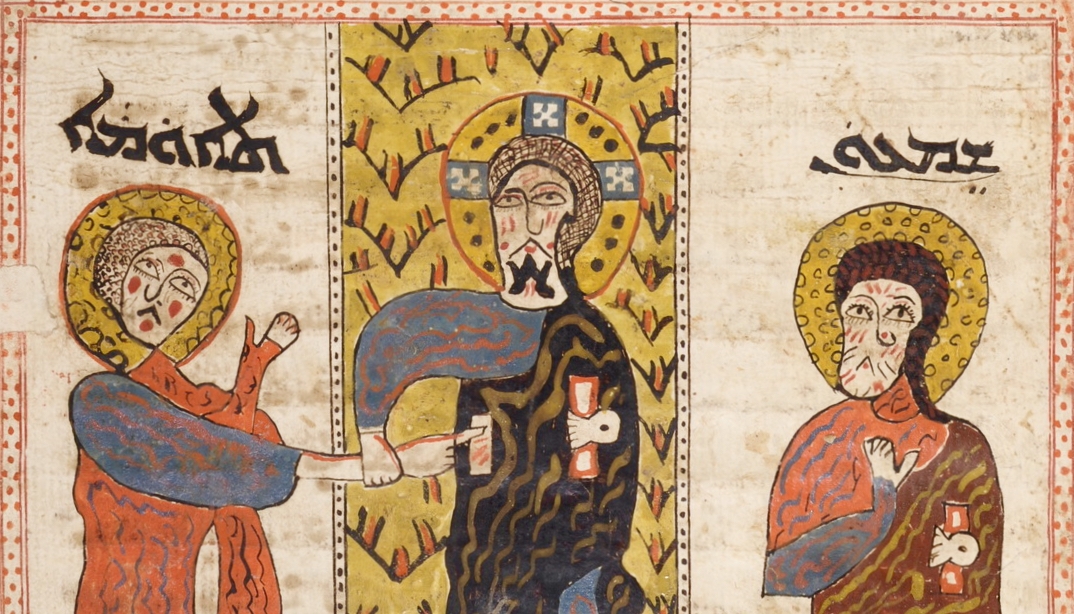
Syrian Christianity, From Jesus to Refugees
CLC 3510
Scott Johnson, Department of Classics and Letters
A defining humanitarian crisis of our age is the persecution and rapid disappearance of religious minorities in the Middle East. The Jews of Aleppo, the Yazidis of Iraq, the Armenian Christians of Turkey, and the Syriac Christians in Syria have all faced intense persecution and dislocation in the past century. A great number of the refugees presently moving into Europe are Syriac Christians who call Syria, Iraq, and Turkey home. These Christians have their own distinctive liturgy and theology and have a patrimony in the Middle East which fundamentalist Islamic groups are trying to eradicate. Studying the long history of Syrian Christianity is fundamental to understanding both the current geopolitical refugee-crisis and the ideologies of modern Islam with respect to the minorities of the Middle East.
This course will introduce students to the long history of Christianity in Syria. We will study their history from a number of angles and using the whole humanistic toolkit: language, literature, art, theology, politics, colonialism, and identity. We will endeavor to understand Syrian Christianity on its own terms while also relating it to the history of Christianity in the region more generally and to the development of medieval and modern Islam. The course will also examine how minorities have found themselves persecuted, sometimes unexpectedly, in the 20th–21st centuries and what appeals to the West have been able to accomplish. Each of the scholars invited to campus will bring research expertise on a different period or theme in Syrian Christian history. All of them have also had experience with modern Syrian churches and have participated in inter-faith dialogues with Muslims.
Public Lecture Series
The Department of Classics and Letters presents a public lecture series in conjunction with the Presidential Dream Course. Presentations are free and open to the public. For information or accommodation to events on the basis of disability, contact Scott Johnson, sfj@ou.edu or at 405-325-6921.
The Apostle Thomas and the Origins of Syrian Christianity

Monday, September 19, 2016
5:00pm
Bizzell Memorial Library, Community Room (LL118)
View Course Flyer [PDF]
Charles M. Stang
Professor of Early Christian Thought, Harvard Divinity School
Dr. Charles Stang’s research and teaching focus on the history and theology of Christianity in late antiquity, especially eastern varieties of Christianity. More specifically, he is interested in the development of asceticism, monasticism, and mysticism in Eastern Christianity. His most recent book, Our Divine Double, appeared in 2016 from Harvard University Press. His earlier book, Apophasis and Pseudonymity in Dionysius the Areopagite: “No Longer I” (Oxford University Press, 2012), won the Manfred Lautenschläger Award for Theological Promise in 2013. Stang’s current projects include a book on the problem of evil in Christianity and Neoplatonism, entitled “Beyond God and Evil,” to be published by Harvard University Press, and a new edition and translation of Evagrius of Pontus's Gnostic Trilogy, to be published by Oxford University Press. Other interests include ancient philosophy, especially Neoplatonism; the Syriac Christian tradition, especially the spread of the East Syrian tradition along the Silk Road; religions of the late antique Mediterranean, especially Manichaeism; and modern continental philosophy and theology, especially as they intersect with the study of religion.
Christians, Muslims, and the End of the Ancient World

Monday, October 3, 2016
5:00pm
Bizzell Memorial Library, Community Room (LL118)
View Course Flyer [PDF]
Jack Tannous
Assistant Professor of History, Princeton University
Dr. Tannous researches the cultural history of the eastern Mediterranean, especially the Middle East, in the Late Antique and early medieval period. His research focuses on the Syriac-speaking Christian communities of the Near East in this period, but he is also interested in a number of other, related areas, including Eastern Christian Studies more broadly, Patristics/early Christian studies, Greco-Syriac and Greco-Arabic translation, Christian-Muslim interactions, sectarianism and identity, early Islamic history, the history of the Arabic Bible, and the Quran. He has published several articles on Syriac intellectual and religious history, especially with regard to Syrian Christianity’s interaction with the Roman/Byzantine Empire and the Islamic world. He is currently finishing a major book entitled "Simple Belief: Religion, Society, and the Making of the Medieval Middle East". He co-edits (with Scott Johnson, OU Classics and Letters) the digital humanities project syri.ac, a comprehensive bibliography of Syriac Studies, which is hosted by OU.
From Heretic to Paragon: Symeon the Stylite and Syrian Monasticism

Tuesday, October 25, 2016
5:00pm
Bizzell Memorial Library, Community Room (LL118)
View Course Flyer [PDF]
Dina Boero
Seeger Center for Hellenic Studies, Princeton University (2016–2017); Assistant Professor of History, The College of New Jersey (2017–)
Dina Boero holds a BA in Religion from the University of California, San Diego and a MA and PhD in Classics from the University of Southern California. She is currently a Research Fellow at the Seeger Center for Hellenic Studies, Princeton University. Her research focuses saints and their cults in the late antique Near East, integrating literary, codicological, and archaeological sources. Her current book project, “The Anatomy of a Cult,” traces the history of Symeon the Stylite the Elder’s (d. 459 CE) cult in the fifth and sixth centuries. This project illuminates the workings of a saint’s cult at the earliest stage of its existence and takes a step towards clarifying the origins of Syrian monasticism. In addition, Dr. Boero has worked on some of the earliest dated manuscripts from western collections and participated in archaeological projects in Syria, Turkey, and Greece. In a recent article, she identifies the Vatican manuscript of the Syriac Life of Symeon (composed in 473, and the fifth earliest dated Syriac manuscript) as the autograph of the text and employs Greek epigraphic evidence to associate its production with a pilgrimage hostel at Symeon’s cult site. She also has discovered a previously unknown homily on Symeon, the first new literary material to come to light on the saint in over a century. She will discuss this discovery as part of her Dream Course public lecture at OU.
Writing on Skin: Specificities of Syriac Culture in the Late Antique Near East

Thursday, November 10, 2016
5:00pm
Bizzell Memorial Library, Community Room (LL118)
View Course Flyer [PDF]
Muriel Debié
Directrice d’études, Section des Sciences Religieuses, École Pratique des Hautes Études, Sorbonne, Paris; Princeton Institute for Advanced Study (2016–2017)
Dr. Muriel Debié studied classics at the Ecole normale supérieure (ENS) in Paris. She fell into Syriac by chance, thanks to her interest in a Syriac text, the so-called Apocalypse of Pseudo-Methodios, a text which was translated almost immediately into Greek and Latin, and then into all the old European languages, and circulated in Russia until the 18th century. Since then she has taught Syriac (first at the Ecole normale supérieure and then at the Catholic University of Paris), while also maintaining an active interest in Greek and other Eastern Christian literature. For her PhD (Paris IV-Sorbonne) she specialized in the history of historical writing. That work ultimately appeared as a magisterial monograph in 2015: L’écriture de l’histoire en Syriaque: Transmissions interculturelles et constructions identitaires entre hellénisme et islam (Peeters). From 2000 to 2012 she held a permanent research position in the National Centre for Scientific Research (CNRS) in Paris, in the Institute for Textual Research and History (IRHT). Since 2012 she has been Directrice d’études at l’École pratique des hautes études (EPHE, Section des Sciences Religieuses). She is a founding member of the Société d'études syriaques, which organizes an international meeting every year on a specific topic of Syriac Studies, and which is then published as a guide to the subject. Beyond her recent monograph, she has published widely on eastern Christianity and Middle Eastern studies and is one of the premier scholars of Syrian Christianity in the world.
Outsiders or Insiders? The Changing Fortunes of Syrian Christians, 1839–2016

Tuesday, November 29, 2016
5:00pm
Bizzell Memorial Library, Community Room (LL118)
View Course Flyer [PDF]
Christian Sahner
Junior Research Fellow, St John’s College, Cambridge
Dr. Christian Sahner is a historian of the Middle East and a Research Fellow at St John’s College, University of Cambridge. His work deals with the transition from late antiquity to the early Islamic period, relations between Muslims and non-Muslims (especially Christians and Zoroastrians), and the history of Syria. Born in New York City, he received an AB in Art and Archaeology from Princeton University, an M.Phil in Late Antique and Byzantine Studies from the University of Oxford, where he studied as a Rhodes Scholar, and a Ph.D. in History also from Princeton. He is the author of Among the Ruins: Syria Past and Present (Oxford/Hurst, 2014), a blend of history and memoir from his time in the Levant. He is currently at work on a second book which explores the little known Christian martyrs of the early Islamic period. It examines episodes of conversion, apostasy, and blasphemy as a way of understanding how an Islamic society first arose amidst the predominantly Christian population of the Middle East and Spain in the early centuries after the Arab conquests. The book is based on his doctoral thesis, which received the 2015 Malcolm H. Kerr Award for best dissertation in the humanities from the Middle East Studies Association. He has held fellowships from the H.F. Guggenheim Foundation and the American Center for Oriental Research, Amman. His work has also appeared in The Times Literary Supplement, The Wall Street Journal, and Project Syndicate, among other publications.

